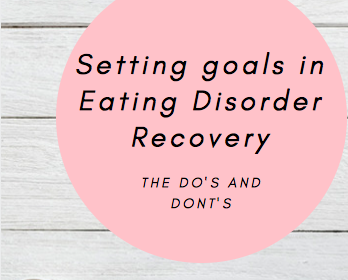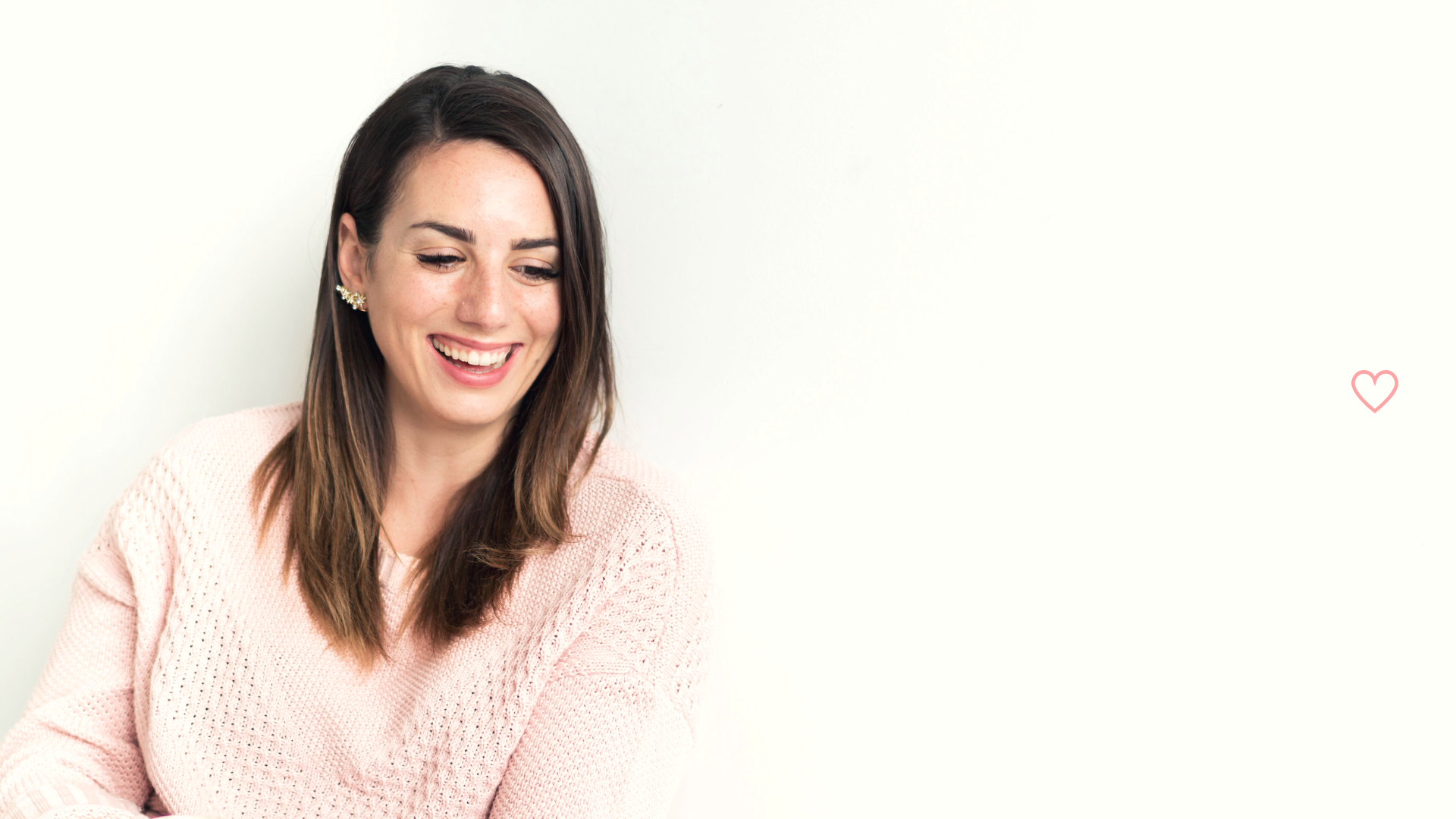
How to set health goals in eating disorder recovery
Is it allowed to set health goals while trying to recover from an eating disorder, disordered eating and/or chronic dieting?
How do you know if your goal setting is coming from a place of self-care and self-acceptance?
How do you know it isn’t the old eating disorder voice, telling you to shrink yourself in the name of health?
It truly is a fine line to balance out health and well-being and to separate goal setting from rigid rules, developing compulsive behaviours or damaging our mental health.
The question whether or not it’s okay to have “health” as a goal in recovery is a question I get on a regular basis. That is why I decided to write about it, so everyone that has this question in the back of their heads can get some answers.
The definition of health
The term “health” has been interpreted in millions of ways, mostly by the diet and wellness industry.
In medical terms, being healthy can be measured by getting a health screening through a blood test.
However, there are other factors that play a role as well, such as your mental health and energy levels.
The diet industry has indoctrinated in us an image of health equals skinny. We are told from a young age that a small body equals a healthy body. We believe that we should shrink our bodies through restriction, dieting and excessive exercise in the name of health (read: weight loss).
What does health mean to you?
Unfortunately, almost all eating disorders, disordered eating and chronic dieting behaviors are rooted in an innocent diet. It always starts as an innocent approach to making our bodies smaller. Depending on your genetics, your environment and your personality, this innocent diet goes on to develop into something nasty. This was the case for me, as well as all my clients and students.
So, I am asking you, friend: When you think of the term “health”, what comes to mind? Do you picture a very lean body with a low body fat percentage? Or do you picture somebody that simply feels good, eats based on their needs and nourishes themselves properly?
If it’s the ladder, this is what health is. It is very broad and looks different on everyone.
Basically, living a healthy lifestyle means that you are not depriving yourself. It means that you are happy on the inside, have balanced energy levels, a good sleep and move when you feel like it. No rigid rules, no tracking, no obsessing about food.
So, now that we got that out of the way, let’s get into the specifics of do’s and don’ts when it comes to goal setting in recovery.
Don’t: Track, count and measure
Counting your calories, tracking your macros or steps and measuring out the food you eat can truly mess with your head. Sooner than you know, you HAVE to track, measure and count everything or you spiral out of control. This is not what being healthy is about. Fun fact: Our bodies are actually meant to take care of how much fuel they need to keep you going. They are meant to do all the work for you (breathing, moving, sending hunger/fullness signals, telling you if you need rest etc.) so YOU can go out there and live your life. Think twice before you convince yourself that you cannot trust your body.
In recovery, we have to give our body time to understand that it can produce balanced levels of hunger and fullness again, because there will always be enough food coming in. Give your body time and grace and eventually the trust will be built back up. It goes both ways. You have to trust in your body that it will balance out over time. In turn, your body has to trust in you not putting it through another famine (read: diet).
Do: Eat enough food
If you are still in the eating disorder/diet-mindset, you will always try to eat as little as possible. Until eventually your body rebels and takes over, if you ever struggled with binge eating or over-eating.
It is a paradox to say the least that we try to eat as little as possible to “get healthy” and in turn, our body takes the wheel and makes you eat way more than you need to prepare for the next famine (diet).
Just think: If you would have never dieted or been shamed about your body by others or yourself, you would have never struggled with binge eating or over-eating. Your body would have handled your hunger and fullness signals just fine.
So, from now on, let’s flip it around and say: We have to eat enough. We have to eat as much as possible, because we have to make sure our body knows that there is an abundance of food. Your body will eventually understand that there is no need to send out binge-urges because we will always have access to food.
Don’t: Place labels on specific foods
Do you feel good about yourself after choosing a salad in the restaurant? Do you feel bad if you choose the burger? Both feeling good and feeling bad are not to be associated with eating. Food is just food. There are no morals connected to it.
Food is there to fuel us, to give us energy and to keep us reaching for our goals in life (and the goal in life should not be to be slim, there is so much more to life!).
In order to set a goal of being healthy, see food as food. It’s not calories. It’s not protein, carbohydrates and fats. It is food that either tastes good or that tastes not so good.
We want to learn to eat foods depending on our needs at any given moment.
For example, the other day I got home from a sweaty workout and felt like eating a big meal. In the past, I would have made sure that I get in a protein shake and a simple carbohydrate such as a piece of fruit. I wouldn’t have let myself have anything with fat in it, because I had such rigid rules. Now that I don’t see food as macros and calories anymore, I asked myself what would make me feel good.
So I cooked up a huge veggie omelette with swiss cheese and had avocado toast on the side. It is what I truly wanted and it made me feel good. No more labels. No more rules.
Do: Take care of yourself
Self-care is a trendy term these days. We associate it with bubble baths, nails salons and face masks. However, while these things are great, self-care goes a lot deeper than that. I wrote a blog post about it a while ago that goes more into detail. What it comes down to is this: What makes you feel good? Is it staying home on a Friday night, drinking a glass of wine and watching “This Is Us”? Maybe it is reading a book? Calling an old friend? Self-care could be cooking a big batch of Mac and Cheese? Maybe it’s canceling plans or saying “no” to your boss at work when you feel overwhelmed with tasks.
Self-care is setting boundaries for yourself, so you can put on your own oxygen mask first before helping others.
Don’t: Set aesthetic goals
If you are trying to recover, but are still body checking yourself every hour or every day, that’s not going to get you where you want to be. This will keep you in the obsessive cycle. If you are still weighing yourself, you are still placing your self-worth on a number. Self-worth is never a number and you won’t find it within yourself if you attach it to a little machine that spits out numbers. If you still want to have muscle definition and a six-pack, that won’t get you over the hump of recovery.
In order to recover, you have to surrender to what your body will look like, without knowing what the outcome is.
This is the scariest part of recovery that holds most people back from ever embarking on this journey.
Your body will find its ideal weight over time and it takes months or even a full year of re-feeding your body and practicing self-care.
Patience and trust is your friend here. Without trusting that your body will find its ideal size over time, you will still try to manipulate your body into looking a certain way. That’s not what we want.
You have made the decision to recover, which is what many people will never do, so be PROUD of yourself and keep going.
Do: Focus on connection, laughter, joy and things you love
How do you want to feel when you have reached a state of full recovery? Try visualizing a recovered version of yourself. Picture this:
Your friends ask you if you want to go out for ice cream and you say “hell yes!” without panicking. You sit with your friends over brunch and talk about your dreams and goals in life that have absolutely nothing to do with your body. No conversation is ever over-shadowed by calculating calories and macros in your head, because you are truly present in the moment.
You are nurturing your connections and relationships, because you truly care about other people.
You are spending your days doing things you love, instead of planning your next meal, tracking your food on My Fitness Pal or scheduling in your workouts in terms of how many calories you want to burn.
Wouldn’t that be so much more fulfilling than a life ruled by numbers?
Do: Find out what healthy means to YOU
If at this stage, healthy means having a shredded body or maintaining the size “you have worked so hard for”, you might just not be ready for a full recovery yet. And that’s okay. Don’t judge yourself.
Trust me when I say, you will KNOW when you are truly ready to surrender. There will be a moment, maybe just a tiny insignificant one, where you will think: I am ready for this.
When this time comes, don’t hesitate to reach out to me. Having support in this stage in your life is so important.
The cases of relapses are huge and I want you to find true freedom for the
Will there ever be a perfect moment to start your recovery journey? In most cases, no. The only moment you have is the here and now. I encourage you to not wait any longer, because you are giving away precious time of your life you will never ever get back. Always here for you!




